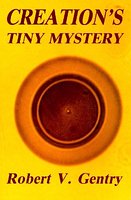|
Earth Science Associates |
||||||||
|
|||||||||
|
Creation's Tiny Mystery |
|||||||||
|
|
Declination of 1977 ProposalIn 1977 I submitted a grant proposal to the NSF which was very similar to the one it had funded in 1974. I requested funds (1) to continue the search for superheavy elements, (2) for additional research on polonium, dwarf, and giant halos in granites, and (3) for further investigations of halos in coalified wood. This time my proposal was declined. My collaborators in the superheavy element experiments at Florida State University and the University of California-Davis were still receiving NSF funding for further work on superheavy elements. But my proposal to continue similar work had been denied. I wrote for an explanation. Funding decisions within the NSF are based on reviews by six scientists who respond by mail, in addition to panel reviews by six other scientists. Of the six mail reviews of my 1977 proposal, four had actually recommended further funding. The two negative ones cited as their main reason the mistaken identification of superheavy elements. In contrast to the mail reviews, the panel review evaluation of my proposal was largely negative. Upon my request, Dr. John Hower, then Program Director for Geochemistry at NSF, sent a summary of the panel discussion. It dealt at length with my research on superheavy elements, concluding that "there is little possibility of their detection by proposed techniques." Yet my colleagues at FSU and UC-Davis were using one of the same techniques outlined in my proposal, and the NSF was continuing their funding. In my case, the panel reviewers decided to reject my entire proposal for what I think were spurious reasons. The following quote from Dr. Hower's letter to me describes the decisive objection found by the panel reviewers in my proposal: The most important criticism of the proposal did not, however, have to do with superheavy elements detection. The criticism stemmed from the general nature of the proposed research on haloes. The principal investigator has been collecting specimens, examining them petrographically, and reporting their morphology and mineral occurrence for a number of years. The panel considered that these descriptive contributions have been of some value, but felt that more of the same approach had little [p. 77] potential to contribute something new. The main difficulty with the proposal is that (aside from the superheavy element search) there was no hypothesis concerning the origin of the haloes that the principal investigator proposed to test. He has already looked at and described a number of occurrences. The panel felt that it was not justified in recommending funding of a research project that merely proposed to make additional observations of the phenomenon. There seems little possibility that the principal investigator could arrive at a hypothesis by looking at additional haloes since he has not been able to propose one at this time. (Hower 1977; Appendix—italics mine) Initially I understood "haloes" in the first italicized phrase referred to both giant halos and polonium halos as discussed in the proposal. "Haloes" in the second italicized phrase I understood to mean primarily giant halos because of the reference to superheavy elements. And since "haloes" in the last italicized phrase was not qualified, I again assumed it referred to polonium halos in granites. On that basis I felt there were some contradictions in the NSF handling of my case, and I decided to appeal their declination of my proposal. Appeal to the NSFThe relevant part of my appeal letter, addressed to Dr. Edward Todd, the Assistant Director for Astronomical, Atmospheric, Earth, and Atmospheric Sciences, National Science Foundation, is as follows:
Much later it occurred to me that the panel reviewers may never have intended any reference to polonium halos in their comments. Perhaps they decided to just ignore this phase of my proposal. In any event, Dr. Todd's response to my appeal letter did not address this issue. It stated:
In this response, Dr. Todd ignored the three main points of my appeal letter: (1) NSF support of the other researchers who participated in the original superheavy element experiments, while denying similar support for my research; (2) the panel's refusal to acknowledge that I had proposed a hypothesis for the origin of polonium halos; (3) my claim of finding evidence which challenges the foundations of modern cosmology and geochemistry. Todd's silence on these points led me to believe it would be futile to appeal this decision to a higher level of NSF. Was my proposal rejected because of philosophic bias rather than scientific considerations?
|
|
||||||
|
|
|||||||||
|
|||||||||
|
Earth Science Associates
|
|||||||||


